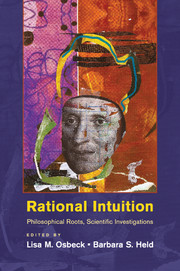11 results
Rational Intuition - Title page
-
-
- Book:
- Rational Intuition
- Published online:
- 05 September 2014
- Print publication:
- 25 August 2014, pp iii-iii
-
- Chapter
- Export citation
Rational Intuition: Philosophical Roots, Scientific Investigations - Half title page
-
- Book:
- Rational Intuition
- Published online:
- 05 September 2014
- Print publication:
- 25 August 2014, pp i-ii
-
- Chapter
- Export citation
Acknowledgments
-
- Book:
- Rational Intuition
- Published online:
- 05 September 2014
- Print publication:
- 25 August 2014, pp ix-x
-
- Chapter
- Export citation
Index
-
- Book:
- Rational Intuition
- Published online:
- 05 September 2014
- Print publication:
- 25 August 2014, pp 421-440
-
- Chapter
- Export citation
Copyright page
-
- Book:
- Rational Intuition
- Published online:
- 05 September 2014
- Print publication:
- 25 August 2014, pp iv-iv
-
- Chapter
- Export citation
Contents
-
- Book:
- Rational Intuition
- Published online:
- 05 September 2014
- Print publication:
- 25 August 2014, pp v-vi
-
- Chapter
- Export citation
Part II - Intuition in Psychology and Cognitive Science
-
- Book:
- Rational Intuition
- Published online:
- 05 September 2014
- Print publication:
- 25 August 2014, pp 211-420
-
- Chapter
- Export citation
Contributors
-
-
- Book:
- Rational Intuition
- Published online:
- 05 September 2014
- Print publication:
- 25 August 2014, pp vii-viii
-
- Chapter
- Export citation

Rational Intuition
- Philosophical Roots, Scientific Investigations
-
- Published online:
- 05 September 2014
- Print publication:
- 25 August 2014
Introduction
-
-
- Book:
- Rational Intuition
- Published online:
- 05 September 2014
- Print publication:
- 25 August 2014, pp 1-36
-
- Chapter
- Export citation
Part I - Intuition in Western Philosophy
-
- Book:
- Rational Intuition
- Published online:
- 05 September 2014
- Print publication:
- 25 August 2014, pp 37-210
-
- Chapter
- Export citation

